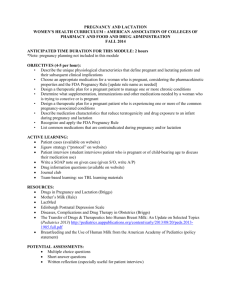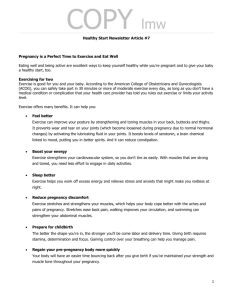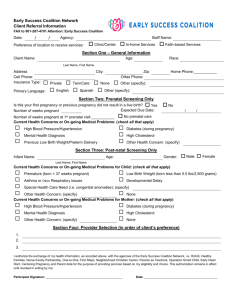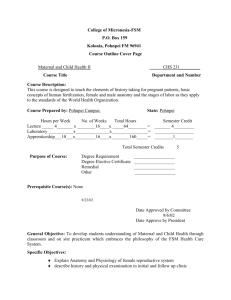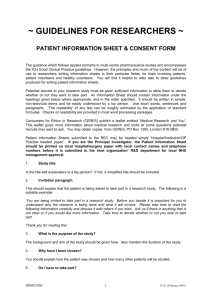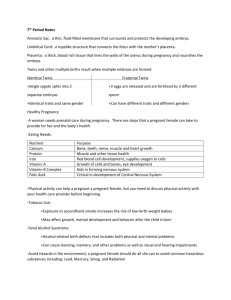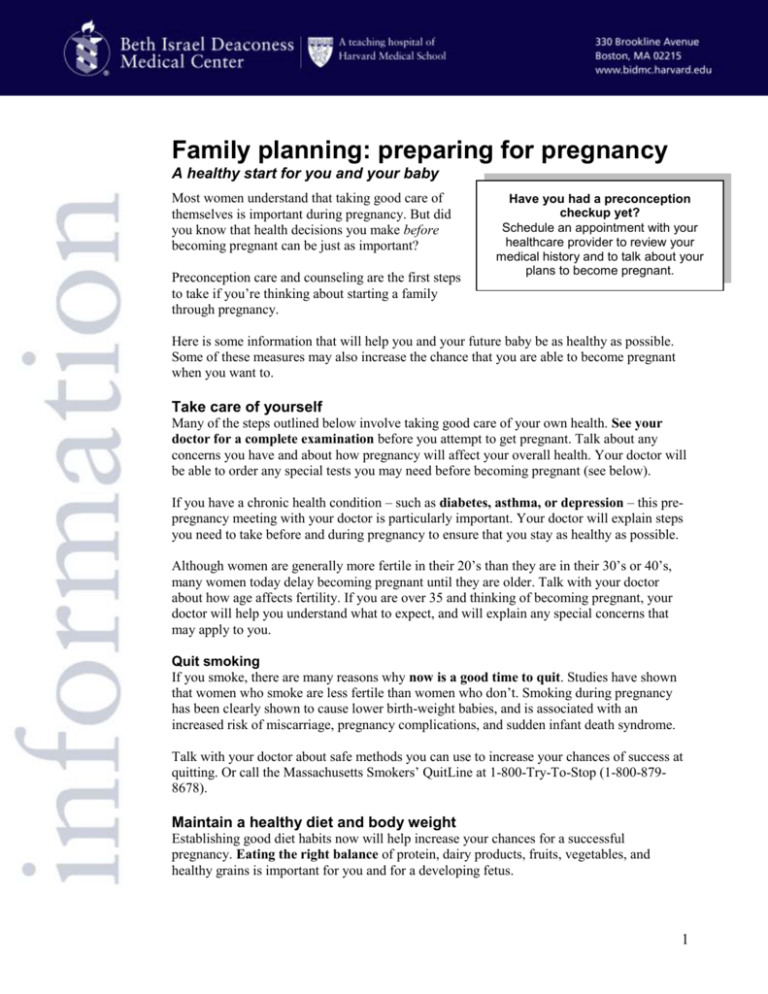
Family planning: preparing for pregnancy
A healthy start for you and your baby
Most women understand that taking good care of
themselves is important during pregnancy. But did
you know that health decisions you make before
becoming pregnant can be just as important?
Preconception care and counseling are the first steps
to take if you’re thinking about starting a family
through pregnancy.
Have you had a preconception
checkup yet?
Schedule an appointment with your
healthcare provider to review your
medical history and to talk about your
plans to become pregnant.
Here is some information that will help you and your future baby be as healthy as possible.
Some of these measures may also increase the chance that you are able to become pregnant
when you want to.
Take care of yourself
Many of the steps outlined below involve taking good care of your own health. See your
doctor for a complete examination before you attempt to get pregnant. Talk about any
concerns you have and about how pregnancy will affect your overall health. Your doctor will
be able to order any special tests you may need before becoming pregnant (see below).
If you have a chronic health condition – such as diabetes, asthma, or depression – this prepregnancy meeting with your doctor is particularly important. Your doctor will explain steps
you need to take before and during pregnancy to ensure that you stay as healthy as possible.
Although women are generally more fertile in their 20’s than they are in their 30’s or 40’s,
many women today delay becoming pregnant until they are older. Talk with your doctor
about how age affects fertility. If you are over 35 and thinking of becoming pregnant, your
doctor will help you understand what to expect, and will explain any special concerns that
may apply to you.
Quit smoking
If you smoke, there are many reasons why now is a good time to quit. Studies have shown
that women who smoke are less fertile than women who don’t. Smoking during pregnancy
has been clearly shown to cause lower birth-weight babies, and is associated with an
increased risk of miscarriage, pregnancy complications, and sudden infant death syndrome.
Talk with your doctor about safe methods you can use to increase your chances of success at
quitting. Or call the Massachusetts Smokers’ QuitLine at 1-800-Try-To-Stop (1-800-8798678).
Maintain a healthy diet and body weight
Establishing good diet habits now will help increase your chances for a successful
pregnancy. Eating the right balance of protein, dairy products, fruits, vegetables, and
healthy grains is important for you and for a developing fetus.
1
Being either overweight or underweight can decrease your fertility and make it harder to
become pregnant. And obesity during pregnancy has been associated with complications
such as diabetes, preeclampsia, and birth
defects.
If you need help planning a healthy diet, your
doctor can refer you to a clinical dietitian.
Is my body weight healthy?
Vitamins, herbs, and supplements:
what you need to know
Your body mass index, or BMI, is the best
way to tell. To find your BMI, use a table
(found on many websites), or the following
formula:
Many people think that vitamins, herbs, and
supplements can never be harmful. But this is
not true. For example, women who take high
doses of Vitamin A have an increased chance
of having a baby with birth defects. If you are
trying to get pregnant, doctors recommend
that you stop using megavitamins and nonessential dietary supplements. If you use
herbal preparations, talk with your doctor
about whether they are safe to continue.
1. What is your weight in pounds? Write
your answer ____________
2. Multiply your answer in #1 by 705. Write
your answer ___________
3. What is your height in inches? Write your
answer __________
4. Multiply the answer in #3 by itself. Write
your answer ____________
5. Divide the answer in #2 by the answer in
#4. This is your BMI.
A BMI of 18.5 – 24.9 is considered normal.
For most women, it makes good sense to take
either a folic acid supplement or a prenatal
vitamin with folic acid during the childbearing years. Folic acid should definitely be taken if
you are actively trying to become pregnant. Folic acid, or folate, has been found to be
important in preventing the development of a group of birth defects called neural tube
defects. Examples of neural tube defects are spina bifida and anencephaly. Folic acid is also
needed by both you and a developing fetus in order to form red blood cells.
Diet alone rarely provides the amount of folic acid needed for a healthy pregnancy.
Taking at least 400 micrograms a day of folic acid before you become pregnant helps lower
your baby’s risk for neural tube defects. (Many prenatal vitamins contain 1 milligram of folic
acid, which is 1,000 micrograms.)
What about exercise?
It’s important to achieve a healthy balance of rest and exercise if you are planning to
become pregnant. Regular aerobic exercise helps keep you fit before and during pregnancy.
If you are not used to exercising, talk with your doctor before starting a new routine. Take it
slowly at first and build up gradually.
If you are already exercising regularly, there is usually no need to change your routine if you
are trying to get pregnant. However, in some women, excessive, heavy exercise may be
associated with infertility. Talk with your doctor about your usual exercise routine and
whether it will impact your chance of a healthy pregnancy.
2
Harmful substances and infections
In addition to tobacco, a number of other substances should either be avoided or limited by
anyone who plans to become pregnant.
Alcohol – Pregnant women are advised to stop all alcohol consumption. If you are
actively trying to become pregnant, it makes sense to stop alcohol consumption now,
because – in most cases – 2-4 weeks of pregnancy will pass before you know you are
pregnant.
Heavy alcohol use is unhealthy for anyone. If either you or your male partner drinks
heavily, you will decrease your chance of becoming pregnant.
Caffeine – Studies suggest that heavy use of caffeine may be associated with decreased
fertility and increased risk of miscarriage or stillbirth. If you are planning to become
pregnant, doctors recommend that you limit caffeine to less than 250 mg. per day. (One
cup of coffee contains about 115
milligrams.)
Ask for help…
Recreational drugs – Drugs are
harmful to you and can be very
damaging to a fetus if you become
pregnant. If you need help to stop using
these substances, please talk with your
doctor.
Harmful toxins – A number of toxins in food or in the environment can be harmful to a
growing fetus and should be avoided by anyone planning to become pregnant.
Smoking, alcohol, and drugs can all harm a
developing fetus. If you want to become
pregnant and need help stopping these habits,
talk to your doctor about a referral.
Toxoplamosis – This condition – caused by an organism present in raw or
undercooked meat, in cat litter, and in soil – can be dangerous in pregnancy. Cook
meats well, do not handle cat litter (or wear gloves if you must), and wear gloves
when gardening.
Food-borne illness – Some foods contain bacteria or other organisms that can be
harmful to you or to a fetus. Stay away from raw or undercooked meat, fish, eggs, or
poultry, and most soft cheeses (such as brie or feta cheese). Wash all fruits and
vegetables. Do not drink unpasteurized milk or fruit juices. Heat until steaming hot
all hot dogs, luncheon meats, or deli meats. Do not eat non-cooked, processed, or
refrigerated pate or meat spreads or refrigerated smoked seafood (such as lox).
Dangers from fish – If you are trying to get pregnant, you should limit your weekly
intake of fish and avoid fish known to have high mercury content, such as shark,
swordfish, king mackerel, tuna steak, and tilefish. Bluefish and lobster tomalley (the
soft green substance in the lobster) should also not be eaten because of PCB
contamination. If you regularly enjoy fish, talk to your provider about a weekly
intake that is right for you.
Aspartame, or Nutrasweet – Use of this common sweetener should be limited if
you are planning to become pregnant.
3
Infections – Certain viral infections can cause
complications in pregnancy. Before you become
pregnant, talk with your doctor about your risk
for developing these infections and about any
steps your can take to reduce the risk. In some
cases, blood tests are available that will tell you
whether or not you are immune to a virus.
Vaccines may be available if you are not immune
and should be given before you start trying to
become pregnant.
Blood tests before pregnancy
Document your blood type,
which can affect the health of
a fetus
Tell if you are immune to
certain viruses
Can uncover genetic problems
Chickenpox – Most women are immune, even if they don’t think they had the
disease. A vaccine is available for women who are not immune.
Rubella – Also known as German measles, this virus causes serious birth defects if
contracted during pregnancy. However, most women are immune. Your doctor will
probably order a blood test to make sure you are immune to rubella. If you are not, a
vaccine is available.
Fifth’s disease and Cytomegalovirus (CMV) – These viral illnesses are common in
children. Many women are immune. Talk to your doctor about whether a blood test or
special precautions are needed.
Hepatitis – Your doctor can tell you if you are at risk for hepatitis and what steps
need to be taken. Blood tests and/or a vaccine may be prescribed.
HIV/AIDS – If you are HIV positive, medications taken during pregnancy can
significantly decrease the chance that your baby will be infected. You can be infected
with HIV and not realize it. Most doctors now recommend that all pregnant women
know their HIV status just to be safe. Your doctor can arrange for you to have an HIV
test.
Screening for genetic problems
Problems with the genes of either the mother or the father can cause birth defects in a baby.
When you talk with your doctor about becoming pregnant, be sure to ask whether genetic
tests or genetic counseling makes sense for you. Your doctor will want to know whether
you or your partner have a family history of a genetic condition, and will also ask questions
about your age and ethnic background. Depending on your situation, your doctor may
recommend that you and/or your partner have blood tests to see if you are carriers of
conditions such as cystic fibrosis or sickle cell disease. If one or both partners are carriers,
you can be referred to a genetic counselor before you become pregnant to find out what the
results mean for you.
We hope you have found this information helpful as you “prepare for pregnancy!”
Please be sure to ask about anything you don’t understand.
This material was prepared by Marie Celestin from the BIDMC Women’s Health Center and Dr. Joyce Sackey. It is produced
and distributed by the Beth Israel Deaconess Learning Center. @2008, Beth Israel Deaconess Medical Center. All rights
reserved. MC0975 08/08
4

